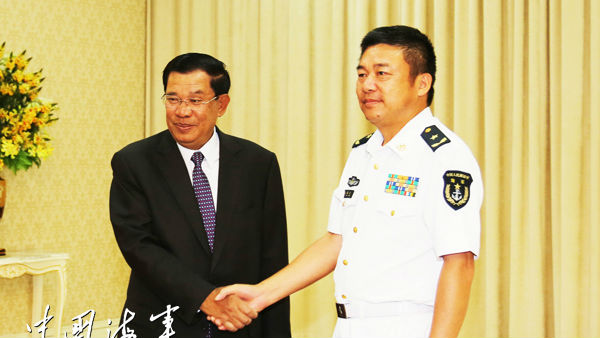Chinese Admiral Talks Warships with Cambodia

China held a joint naval drill with Cambodia for the first time on Friday, tightening a budding relationship that could give Beijing a small but strategic foothold in a region being strongly courted by the United States.
Sailors from both countries took part in a rescue exercise in Preah Sihanouk during a five-day trip that the ranking Chinese navy officer, Rear Admiral Yu Manjiang, said showed their warm ties and was "like visiting a sibling's home."
The visit also saw some discussion about China possibly supplying Cambodia with warships to defend its maritime territory.
Though Cambodia's naval capacity is dwarfed by that of its neighbors, its armed forces have benefited greatly from Chinese military sales and donations of jeeps, shoulder-fired rockets and helicopters, and its help in running a Cambodian defense academy.
"The navy wants two warships and the defense ministers from the two countries are still contacting each other," Tea Vinh, Cambodia's navy commander, said during a meeting with Yu in Phnom Penh where he pledged strong support for Beijing's one China policy.
Cambodian Prime Minister Hun Sen also met with Manjiang. Sen said he hoped that the navies of the two countries would strengthen exchange and deepen their cooperation in various areas, especially holding joint humanitarian drills involving rescuing ships in distress and protecting merchant ships, so as to upgrade the defensive capability of the Cambodian Navy troops when facing threats.
Manjiang said that strengthening cooperation between the navies of the two countries is not only in line with the fundamental interests of the Chinese and Cambodian peoples, but also conducive to building the “Belt and Road Initiatives”, promoting the economic construction of the two countries and cracking down on terrorists.
China's ties with Cambodia have won it some indirect influence within the Association of Southeast Asian Nations (ASEAN) grouping, although Phnom Penh vehemently rejects any notion of it doing Beijing's bidding in the 10-member bloc in which one country has the power to veto collective decisions.
The exercise comes amid regional tension over reports that China is deploying advanced missiles, fighters and radar equipment on islands in the South China Sea, which are the subject of decades-old territorial squabbles among several countries.
Despite its complaints about Cambodia's poor human rights record, the United States has maintained its engagement with Phnom Penh and wants good ties with its military, with which it has held six joint navy exercises.
In a statement responding to questions, the U.S embassy in Cambodia said its diplomatic activities were "not based on competition with China" but cooperation on trade and tackling terrorism, climate change and human trafficking.
Opposition politician Son Chhay said part of the reason Cambodia is perceived as drifting into China's orbit was because the government held the view that the U.S was applying diplomatic pressure alongside its offers of aid.
"The prime minister might think that by showing his friendly support toward China, his government might have a chance to attract some investment from China and help open up its market for Cambodia's agriculture goods," Son Chhay said.
